formerly eScholarship Editions


|
|
|
|
Your search for
'European Studies' in subject
found 58 book(s). | Modify Search | Displaying 21 - 40 of 58 book(s) | |
| 21. | 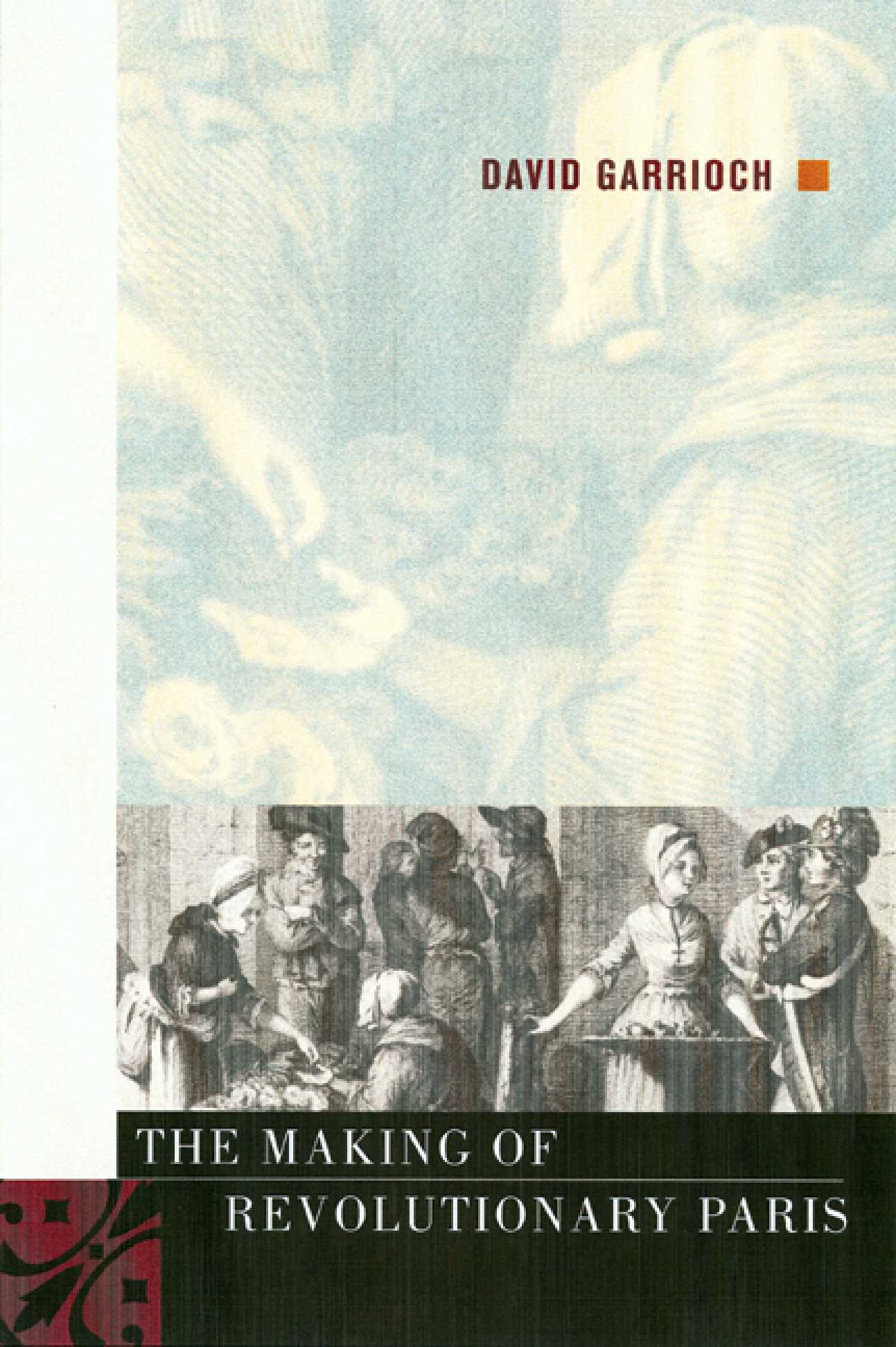 | Title: The making of revolutionary Paris Author: Garrioch, David Published: University of California Press, 2002 Subjects: History | European History | European Studies | French Studies Publisher's Description: The sights, sounds, and smells of life on the streets and in the houses of eighteenth-century Paris rise from the pages of this marvelously anecdotal chronicle of a perpetually alluring city during one hundred years of extraordinary social and cultural change. An excellent general history as well as an innovative synthesis of new research, The Making of Revolutionary Paris combines vivid portraits of individual lives, accounts of social trends, and analyses of significant events as it explores the evolution of Parisian society during the eighteenth century and reveals the city's pivotal role in shaping the French Revolution. David Garrioch rewrites the origins of the Parisian Revolution as the story of an urban metamorphosis stimulated by factors such as the spread of the Enlightenment, the growth of consumerism, and new ideas about urban space. With an eye on the broad social trends emerging during the century, he focuses his narrative on such humble but fascinating aspects of daily life as traffic congestion, a controversy over the renumbering of houses, and the ever-present dilemma of where to bury the dead. He describes changes in family life and women's social status, in religion, in the literary imagination, and in politics. Paris played a significant role in sparking the French Revolution, and in turn, the Revolution changed the city, not only its political structures but also its social organization, gender ideologies, and cultural practices. This book is the first to look comprehensively at the effect of the Revolution on city life. Based on the author's own research in Paris and on the most current scholarship, this absorbing book takes French history in new directions, providing a new understanding of the Parisian and the European past. [brief] Similar Items |
| 22. | 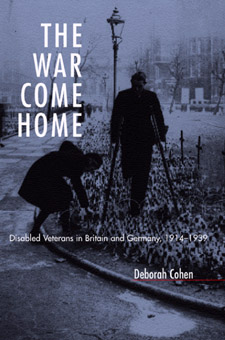 | Title: The war come home: disabled veterans in Britain and Germany, 1914-1939 Author: Cohen, Deborah 1968- Published: University of California Press, 2001 Subjects: History | European History | German Studies | Military History | European Studies Publisher's Description: Disabled veterans were the First World War's most conspicuous legacy. Nearly eight million men in Europe returned from the First World War permanently disabled by injury or disease. In The War Come Home, Deborah Cohen offers a comparative analysis of the very different ways in which two belligerent nations--Germany and Britain--cared for their disabled. At the heart of this book is an apparent paradox. Although postwar Germany provided its disabled veterans with generous benefits, they came to despise the state that favored them. Disabled men proved susceptible to the Nazi cause. By contrast, British ex-servicemen remained loyal subjects, though they received only meager material compensation. Cohen explores the meaning of this paradox by focusing on the interplay between state agencies and private philanthropies on one hand, and the evolving relationship between disabled men and the general public on the other. Written with verve and compassion, The War Come Home describes in affecting detail disabled veterans' lives and their treatment at the hands of government agencies and private charities in Britain and Germany. Cohen's study moves from the intimate confines of veterans' homes to the offices of high-level bureaucrats; she tells of veterans' protests, of disabled men's families, and of the well-heeled philanthropists who made a cause of the war's victims. This superbly researched book provides an important new perspective on the ways in which states and societies confront the consequences of industrialized warfare. [brief] Similar Items |
| 23. | 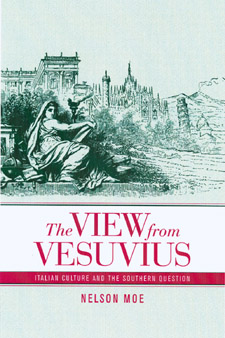 | Title: The view from Vesuvius: Italian culture and the southern question Author: Moe, Nelson 1961- Published: University of California Press, 2002 Subjects: European Studies | European History | Intellectual History | Politics | European Literature Publisher's Description: The vexed relationship between the two parts of Italy, often referred to as the Southern Question, has shaped that nation's political, social, and cultural life throughout the twentieth century. But how did southern Italy become "the south," a place and people seen as different from and inferior to the rest of the nation? Writing at the rich juncture of literature, history, and cultural theory, Nelson Moe explores how Italy's Mezzogiorno became both backward and picturesque, an alternately troubling and fascinating borderland between Europe and its others. This finely crafted book shows that the Southern Question is far from just an Italian issue, for its origins are deeply connected to the formation of European cultural identity between the mid-eighteenth and late nineteenth centuries. Moe examines an exciting range of unfamiliar texts and visual representations including travel writing, political discourse, literary texts, and etchings to illuminate the imaginative geography that shaped the divide between north and south. His narrative moves from a broad examination of the representation of the south in European culture to close readings of the literary works of Leopardi and Giovanni Verga. This groundbreaking investigation into the origins of the modern vision of the Mezzogiorno is made all the more urgent by the emergence of separatism in Italy in the 1990s. [brief] Similar Items |
| 24. | 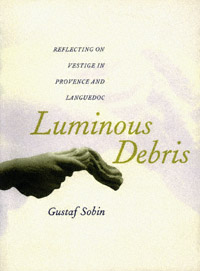 | Title: Luminous debris: reflecting on vestige in Provence and Languedoc Author: Sobin, Gustaf Published: University of California Press, 2000 Subjects: Literature | Cultural Anthropology | European Studies | Ancient History | Philosophy | French Studies Publisher's Description: Interpreting vestige with the eloquence of a poet and the knowledge of a field archaeologist, Gustaf Sobin explores his elected terrain: the landscapes of Provence and Languedoc. Drawing on prehistory, protohistory, and Gallo-Roman antiquity, the twenty-six essays in this book focus on a particular place or artifact for the relevance inherent in each. A Bronze Age earring or the rippling wave pattern in Massiolite ceramic are more than archival curiosities for Sobin. Instead they invite inquiry and speculation on existence itself: Artifacts are read as realia, and history as an uninterrupted sequence of object lessons.As much travel writing as meditative discourse, Luminous Debris is enhanced by a prose that tracks, questions, and reflects on the materials invoked. Sobin engages the reader with precise descriptions of those very materials and the messages to be gleaned from their examination, be they existential, ethical, or political.An American expatriate living in Provence for the past thirty-five years, Gustaf Sobin shares his enthusiasm for his adopted landscape and for a vertical interpretation of its strata. In Luminous Debris he creates meaning out of matter and celebrates instances of reality, past and present. [brief] Similar Items |
| 25. | 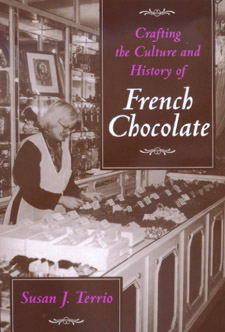 | Title: Crafting the culture and history of French chocolate Author: Terrio, Susan J. (Susan Jane) 1950- Published: University of California Press, 2000 Subjects: Anthropology | European Studies | French Studies | Food and Cooking | Sociology Publisher's Description: This absorbing narrative follows the craft community of French chocolatiers - members of a tiny group experiencing intensive international competition - as they struggle to ensure the survival of their businesses. Susan J. Terrio moves easily among ethnography, history, theory, and vignette, telling a story that challenges conventional views of craft work, associational forms, and training models in late capitalism. She enters the world of Parisian craft leaders and local artisanal families there and in southwest France to relate how they work and how they confront the representatives and structures of power, from taste makers, CEOs, and advertising executives to the technocrats of Paris and Brussels. Looking at craft culture and community from a cross-disciplinary perspective, Terrio finds that the chocolatiers affirm their collective identity and their place in the present by commemorating selectively their role in history. In addition to joining a distinguished tradition of American anthropological writing on the role of food, her study of the social production of taste in the invention of vintage, grand cru chocolates lends specificity and weight to theories of consumption by Pierre Bourdieu and others. The book will appeal to anthropologists, cultural studies scholars, and anyone curious about life in contemporary France. [brief] Similar Items |
| 26. | 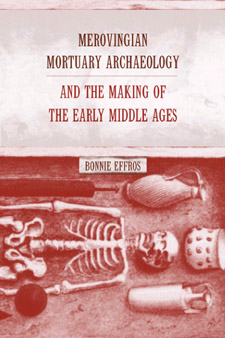 | Title: Merovingian mortuary archaeology and the making of the early Middle Ages Author: Effros, Bonnie 1965- Published: University of California Press, 2003 Subjects: Classics | European Studies | Archaeology | Ancient History | Medieval History | Archaeology Publisher's Description: Clothing, jewelry, animal remains, ceramics, coins, and weaponry are among the artifacts that have been discovered in graves in Gaul dating from the fifth to eighth century. Those who have unearthed them, from the middle ages to the present, have speculated widely on their meaning. This authoritative book makes a major contribution to the study of death and burial in late antique and early medieval society with its long overdue systematic discussion of this mortuary evidence. Tracing the history of Merovingian archaeology within its cultural and intellectual context for the first time, Effros exposes biases and prejudices that have colored previous interpretations of these burial sites and assesses what contemporary archaeology can tell us about the Frankish kingdoms. Working at the intersection of history and archaeology, and drawing from anthropology and art history, Effros emphasizes in particular the effects of historical events and intellectual movements on French and German antiquarian and archaeological studies of these grave goods. Her discussion traces the evolution of concepts of nationhood, race, and culture and shows how these concepts helped shape an understanding of the past. Effros then turns to contemporary multidisciplinary methodologies and finds that we are still limited by the types of information that can be readily gleaned from physical and written sources of Merovingian graves. For example, since material evidence found in the graves of elite families and particularly elite men is more plentiful and noteworthy, mortuary goods do not speak as directly to the conditions in which women and the poor lived. The clarity and sophistication with which Effros discusses the methods and results of European archaeology is a compelling demonstration of the impact of nationalist ideologies on a single discipline and of the struggle toward the more pluralistic vision that has developed in the post-war years. [brief] Similar Items |
| 27. | 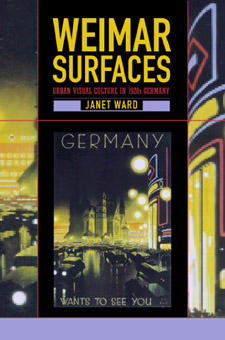 | Title: Weimar surfaces: urban visual culture in 1920s Germany Author: Ward, Janet 1963- Published: University of California Press, 2001 Subjects: Literature | Architecture | Film | European Studies | European History | Popular Culture Publisher's Description: Germany of the 1920s offers a stunning moment in modernity, a time when surface values first became determinants of taste, activity, and occupation: modernity was still modern, spectacle was still spectacular. Janet Ward's luminous study revisits Weimar Germany via the lens of metropolitan visual cu . . . [more] Similar Items |
| 28. | 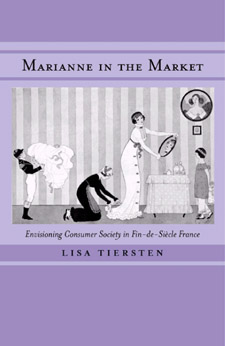 | Title: Marianne in the market: envisioning consumer society in fin-de-siècle France Author: Tiersten, Lisa 1959- Published: University of California Press, 2001 Subjects: European Studies | European History | Consumerism | French Studies | Women's Studies Publisher's Description: In the late nineteenth century, controversy over the social ramifications of the emerging consumer marketplace beset the industrialized nations of the West. In France, various commentators expressed concern that rampant commercialization threatened the republican ideal of civic-mindedness as well as the French reputation for good taste. The female bourgeois consumer was a particularly charged figure because she represented consumption run amok. Critics feared that the marketplace compromised her morality and aesthetic discernment, with dire repercussions for domestic life and public order. Marianne in the Market traces debates about the woman consumer to examine the complex encounter between the market and the republic in nineteenth-century France. It explores how agents of capitalism - advertisers, department store managers, fashion journalists, self-styled taste experts - addressed fears of consumerism through the forging of an aesthetics of the marketplace: a "marketplace modernism." In so doing, they constructed an image of the bourgeois woman as the solution to the problem of unrestrained, individualized, and irrational consumption. Commercial professionals used taste to civilize the market and to produce consumers who would preserve the French aesthetic patrimony. Tasteful consumption legitimized women's presence in the urban public and reconciled their roles as consumers with their domestic and civic responsibilities. A fascinating case study, Marianne in the Market builds on a wide range of sources such as the feminine press, decorating handbooks, exposition reports, advertising materials, novels, and etiquette books. Lisa Tiersten draws on these materials to make the compelling argument that market professionals used the allure of aesthetically informed consumerism to promote new models of the female consumer and the market in keeping with Republican ideals. [brief] Similar Items |
| 29. |  | Title: Medieval stereotypes and modern antisemitism Author: Chazan, Robert Published: University of California Press, 1997 Subjects: Medieval Studies | Jewish Studies | Medieval History | European History | European Studies Publisher's Description: The twelfth century in Europe, hailed by historians as a time of intellectual and spiritual vitality, had a dark side. As Robert Chazan points out, the marginalization of minorities emerged during the "twelfth-century renaissance" as part of a growing pattern of persecution, and among those stigmatized the Jews figured prominently.The migration of Jews to northern Europe in the late tenth century led to the development of a new set of Jewish communities. This northern Jewry prospered, only to decline sharply two centuries later. Chazan locates the cause of the decline primarily in the creation of new, negative images of Jews. He shows how these damaging twelfth-century stereotypes developed and goes on to chart the powerful, lasting role of the new anti-Jewish imagery in the historical development of antisemitism.This coupling of the twelfth century's notable intellectual bequests to the growth of Western civilization with its legacy of virulent anti-Jewish motifs offers an important new key to understanding modern antisemitism. [brief] Similar Items |
| 30. | 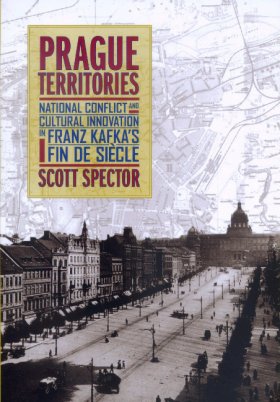 | Title: Prague territories: national conflict and cultural innovation in Franz Kafka's fin de siècle Author: Spector, Scott 1959- Published: University of California Press, 2002 Subjects: History of Food | European History | Jewish Studies | European Studies Publisher's Description: Scott Spector's adventurous cultural history maps for the first time the "territories" carved out by German-Jewish intellectuals living in Prague at the dawn of the twentieth century. Spector explores the social, cultural, and ideological contexts in which Franz Kafka and his contemporaries flourished, revealing previously unseen relationships between politics and culture. His incisive readings of a broad array of German writers feature the work of Kafka and the so-called "Prague circle" and encompass journalism, political theory, Zionism, and translation as well as literary program and practice. With the collapse of German-liberal cultural and political power in the late-nineteenth-century Habsburg Empire, Prague's bourgeois Jews found themselves squeezed between a growing Czech national movement on the one hand and a racial rather than cultural conception of Germanness on the other. Displaced from the central social and cultural position they had come to occupy, the members of the "postliberal" Kafka generation were dazzlingly productive and original, far out of proportion to their numbers. Seeking a relationship between ideological crisis and cultural innovation, Spector observes the emergence of new forms of territoriality. He identifies three fundamental areas of cultural inventiveness related to this Prague circle's political and cultural dilemma. One was Expressionism, a revolt against all limits and boundaries, the second was a spiritual form of Zionism incorporating a novel approach to Jewish identity that seems to have been at odds with the pragmatic establishment of a Jewish state, and the third was a sort of cultural no-man's-land in which translation and mediation took the place of "territory." Spector's investigation of these areas shows that the intensely particular, idiosyncratic experience of German-speaking Jews in Prague allows access to much broader and more general conditions of modernity. Combining theoretical sophistication with a refreshingly original and readable style, Prague Territories illuminates some early signs of a contemporary crisis from which we have not yet emerged. [brief] Similar Items |
| 31. | 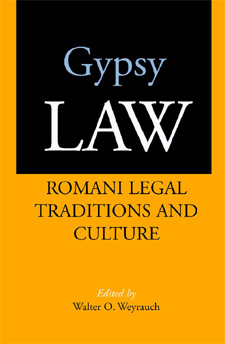 | Title: Gypsy law: Romani legal traditions and culture Author: Weyrauch, Walter O. (Walter Otto) 1919- Published: University of California Press, 2001 Subjects: Law | Cultural Anthropology | Ethnic Studies | Sociology | European Studies | Political Theory Publisher's Description: Approximately one thousand years ago Gypsies, or Roma, left their native India. Today Gypsies can be found in countries throughout the world, their distinct culture still intact in spite of the intense persecution they have endured. This authoritative collection brings together leading Gypsy and non-Gypsy scholars to examine the Romani legal system, an autonomous body of law based on an oral tradition and existing alongside dominant national legal networks. For centuries the Roma have survived by using defensive strategies, especially the absolute exclusion of gadje (non-Gypsies) from their private lives, their values, and information about Romani language and social institutions. Sexuality, gender, and the body are fundamental to Gypsy law, with rules that govern being pure (vujo) or impure (marime) . Women play an important role in maintaining legal customs, having the power to sanction and to contaminate, but they are not directly involved in legal proceedings. These essays offer a comparative perspective on Romani legal procedures and identity, including topics such as the United States' criminalization of many aspects of Gypsy law, parallels between Jewish and Gypsy law, and legal distinctions between Romani communities. The contributors raise broad theoretical questions that transcend the specific Gypsy context and offer important insights into understanding oral legal traditions. Together they suggest a theoretical framework for explaining the coexistence of formal and informal law within a single legal system. They also highlight the ethical dilemmas encountered in comparative law research and definitions of "human rights." [brief] Similar Items |
| 32. | 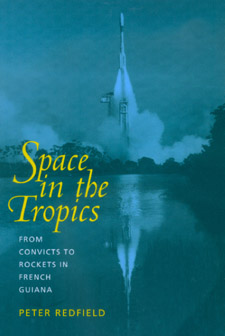 | Title: Space in the tropics: from convicts to rockets in French Guiana Author: Redfield, Peter 1965- Published: University of California Press, 2000 Subjects: Anthropology | Cultural Anthropology | Geography | French Studies | European Studies | Technology Publisher's Description: Rockets roar into space - bearing roughly half the world's commercial satellites - from the same South American coastal rainforest where convicts once did time on infamous Devil's Island. What makes Space in the Tropics enthralling is anthropologist Peter Redfield's ability to draw from these two disparate European projects in French Guiana a gleaming web of ideas about the intersections of nature and culture. In comparing the Franco-European Ariane rocket program with the earlier penal experiment, Redfield connects the myth of Robinson Crusoe, nineteenth-century prison reform, the Dreyfus Affair, tropical medicine, postwar exploration of outer space, satellite technology, development, and ecotourism with a focus on place, and the incorporation of this particular place into greater extended systems. Examining the wider context of the Ariane program, he argues that technology and nature must be understood within a greater ecology of displacement and makes a case for the importance of margins in understanding the trajectories of modern life. [brief] Similar Items |
| 33. |  | Title: Where the world ended: re-unification and identity in the German borderland Author: Berdahl, Daphne 1964- Published: University of California Press, 1999 Subjects: Anthropology | Cultural Anthropology | German Studies | Geography | European Studies | Social Problems Publisher's Description: When the Berlin Wall fell, people who lived along the dismantled border found their lives drastically and rapidly transformed. Daphne Berdahl, through ongoing ethnographic research in a former East German border village, explores the issues of borders and borderland identities that have accompanied the many transitions since 1990. What happens to identity and personhood, she asks, when a political and economic system collapses overnight? How do people negotiate and manipulate a liminal condition created by the disappearance of a significant frame of reference?Berdahl concentrates especially on how these changes have affected certain "border zones" of daily life - including social organization, gender, religion, and nationality - in a place where literal, indeed concrete, borders were until recently a very powerful presence. Borders, she argues, are places of ambiguity as well as of intense lucidity; these qualities may in fact be mutually constitutive. She shows how, in a moment of headlong historical transformation, larger political, economic, and social processes are manifested locally and specifically. In the process of a transition between two German states, people have invented, and to some extent ritualized, cultural practices that both reflect and constitute profound identity transformations in a period of intense social discord. Where the World Ended combines a vivid ethnographic account of everyday life under socialist rule and after German reunification with an original investigation of the paradoxical human condition of a borderland. [brief] Similar Items |
| 34. | 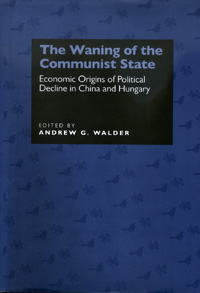 | Title: The waning of the communist state: economic origins of political decline in China and Hungary Author: Walder, Andrew George Published: University of California Press, 1995 Subjects: Politics | Sociology | European History | Asian History | China | European Studies | Economics and Business Publisher's Description: This collection of essays offers a compelling explanation for the decline of communism in the two countries that went the furthest with economic reforms - China and Hungary. Articulating a vision of change that serves as a counterpoint to the prevailing emphasis on citizen resistance and protest, the contributors focus instead on the declining organizational integrity of the centralized party-state. The essays illuminate a "quiet revolution from within" that beset the two regimes after they chose to reform their economies and make concessions to the private sector.The nine contributors, three each from the disciplines of sociology, political science, and anthropology, examine key trends that appeared in both countries. The chapters trace political consequences of economic reform that range from the decline of the central state's fiscal dominance to the revitalization of long-suppressed ethnic loyalties. [brief] Similar Items |
| 35. | 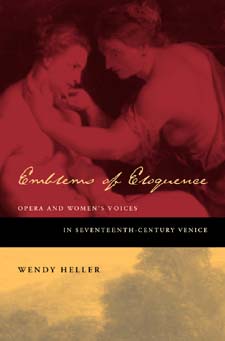 | Title: Emblems of eloquence: opera and women's voices in seventeenth-century Venice Author: Heller, Wendy Beth Published: University of California Press, 2004 Subjects: Music | European Studies | Opera | Classical Music | Women's Studies | Classical Literature and Language | Renaissance History Publisher's Description: Opera developed during a time when the position of women - their rights and freedoms, their virtues and vices, and even the most basic substance of their sexuality - was constantly debated. Many of these controversies manifested themselves in the representation of the historical and mythological women whose voices were heard on the Venetian operatic stage. Drawing upon a complex web of early modern sources and ancient texts, this engaging study is the first comprehensive treatment of women, gender, and sexuality in seventeenth-century opera. Wendy Heller explores the operatic manifestations of female chastity, power, transvestism, androgyny, and desire, showing how the emerging genre was shaped by and infused with the Republic's taste for the erotic and its ambivalent attitudes toward women and sexuality. Heller begins by examining contemporary Venetian writings about gender and sexuality that influenced the development of female vocality in opera. The Venetian reception and transformation of ancient texts - by Ovid, Virgil, Tacitus, and Diodorus Siculus - form the background for her penetrating analyses of the musical and dramatic representation of five extraordinary women as presented in operas by Claudio Monteverdi, Francesco Cavalli, and their successors in Venice: Dido, queen of Carthage (Cavalli); Octavia, wife of Nero (Monteverdi); the nymph Callisto (Cavalli); Queen Semiramis of Assyria (Pietro Andrea Ziani); and Messalina, wife of Claudius (Carlo Pallavicino). [brief] Similar Items |
| 36. | 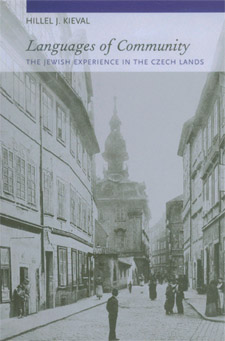 | Title: Languages of community: the Jewish experience in the Czech lands Author: Kieval, Hillel J Published: University of California Press, 2000 Subjects: Jewish Studies | European Studies | European History | Russian and Eastern European Studies | Judaism Publisher's Description: With a keen eye for revealing details, Hillel J. Kieval examines the contours and distinctive features of Jewish experience in the lands of Bohemia and Moravia (the present-day Czech Republic), from the late eighteenth to the late twentieth century. In the Czech lands, Kieval writes, Jews have felt the need constantly to define and articulate the nature of group identity, cultural loyalty, memory, and social cohesiveness, and the period of "modernizing" absolutism, which began in 1780, brought changes of enormous significance. From that time forward, new relationships with Gentile society and with the culture of the state blurred the traditional outlines of community and individual identity. Kieval navigates skillfully among histories and myths as well as demography, biography, culture, and politics, illuminating the maze of allegiances and alliances that have molded the Jewish experience during these 200 years. [brief] Similar Items |
| 37. | 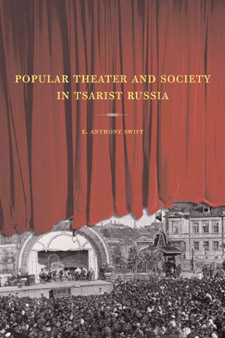 | Title: Popular theater and society in Tsarist Russia Author: Swift, Eugene Anthony Published: University of California Press, 2002 Subjects: History | European History | Russian and Eastern European Studies | Popular Culture | European Literature | European Studies Publisher's Description: This is the most comprehensive study available of the popular theater that developed during the last decades of tsarist Russia. Swift examines the origins and significance of the new "people's theaters" that were created for the lower classes in St. Petersburg and Moscow between 1861 and 1917. His extensively researched study, full of anecdotes from the theater world of the day, shows how these people's theaters became a major arena in which the cultural contests of late imperial Russia were played out and how they contributed to the emergence of an urban consumer culture during this period of rapid social and political change. Swift illuminates many aspects of the story of these popular theaters - the cultural politics and aesthetic ambitions of theater directors and actors, state censorship politics and their role in shaping the theatrical repertoire, and the theater as a vehicle for social and political reform. He looks at roots of the theaters, discusses specific theaters and performances, and explores in particular how popular audiences responded to the plays. [brief] Similar Items |
| 38. | 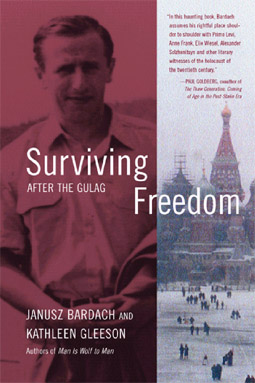 | Title: Surviving freedom: after the Gulag Author: Bardach, Janusz Published: University of California Press, 2003 Subjects: History | European Studies | Sociology | Politics | Russian and Eastern European Studies | Autobiography Publisher's Description: In 1941, as a Red Army soldier fighting the Nazis on the Belarussian front, Janusz Bardach was arrested, court-martialed, and sentenced to ten years of hard labor. Twenty-two years old, he had committed no crime. He was one of millions swept up in the reign of terror that Stalin perpetrated on his own people. In the critically acclaimed Man Is Wolf to Man, Bardach recounted his horrific experiences in the Kolyma labor camps in northeastern Siberia, the deadliest camps in Stalin's gulag system. In this sequel Bardach picks up the narrative in March 1946, when he was released. He traces his thousand-mile journey from the northeastern Siberian gold mines to Moscow in the period after the war, when the country was still in turmoil. He chronicles his reunion with his brother, a high-ranking diplomat in the Polish embassy in Moscow; his experiences as a medical student in the Stalinist Soviet Union; and his trip back to his hometown, where he confronts the shattering realization of the toll the war has taken, including the deaths of his wife, parents, and sister. In a trenchant exploration of loss, post-traumatic stress syndrome, and existential loneliness, Bardach plumbs his ordeal with honesty and compassion, affording a literary window into the soul of a Stalinist gulag survivor. Surviving Freedom is his moving account of how he rebuilt his life after tremendous hardship and personal loss. It is also a unique portrait of postwar Stalinist Moscow as seen through the eyes of a person who is both an insider and outsider. Bardach's journey from prisoner back to citizen and from labor camp to freedom is an inspiring tale of the universal human story of suffering and recovery. [brief] Similar Items |
| 39. | 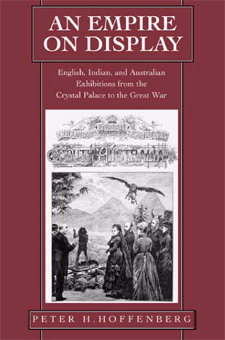 | Title: An empire on display: English, Indian, and Australian exhibitions from the Crystal Palace to the Great War Author: Hoffenberg, Peter H 1960- Published: University of California Press, 2001 Subjects: History | European History | Victorian History | Asian History | South Asia | Pacific Rim Studies | European Studies Publisher's Description: The grand exhibitions of the Victorian and Edwardian eras are the lens through which Peter Hoffenberg examines the economic, cultural, and social forces that helped define Britain and the British Empire. He focuses on major exhibitions in England, Australia, and India between the Great Exhibition of 1851 and the Festival of Empire sixty years later, taking special interest in the interactive nature of the exhibition experience, the long-term consequences for the participants and host societies, and the ways in which such popular gatherings revealed dissent as well as celebration. Hoffenberg shows how exhibitions shaped culture and society within and across borders in the transnational working of the British Empire. The exhibitions were central to establishing and developing a participatory imperial world, and each polity in that world provided distinctive information, visitors, and exhibits. Among the displays were commercial goods, working machines, and ethnographic scenes. Exhibits were intended to promote external commonwealth and internal nationalism. The imperial overlay did not erase significant differences but explained and used them in economic and cultural terms. The exhibitions in cities such as London, Sydney, and Calcutta were living and active public inventories of the Empire and its national political communities. The process of building and consuming such inventories persists today in the cultural bureaucracies, museums, and festivals of modern nation-states, the appeal to tradition and social order, and the actions of transnational bodies. [brief] Similar Items |
| 40. | 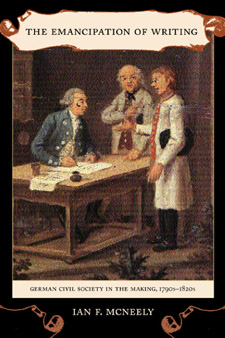 | Title: The emancipation of writing: German civil society in the making, 1790s-1820s Author: McNeely, Ian F 1971- Published: University of California Press, 2003 Subjects: History | European Studies | German Studies | European History | Sociology | Political Theory | Anthropology Publisher's Description: The Emancipation of Writing is the first study of writing in its connection to bureaucracy, citizenship, and the state in Germany. Stitching together micro- and macro-level analysis, it reconstructs the vibrant, textually saturated civic culture of the German southwest in the aftermath of the French Revolution and Napoleon's invasions. Ian F. McNeely reveals that Germany's notoriously oppressive bureaucracy, when viewed through the writing practices that were its lifeblood, could also function as a site of citizenship. Citizens, acting under the mediation of powerful local scribes, practiced their freedoms in written engagements with the state. Their communications laid the basis for civil society, showing how social networks commonly associated with the free market, the free press, and the voluntary association could also take root in powerful state institutions. [brief] Similar Items |